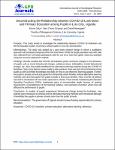| dc.contributor.author | Odur, Bruno | |
| dc.contributor.author | Chono, Oryang Alex | |
| dc.contributor.author | Mwesigwa, David | |
| dc.date.accessioned | 2023-02-06T12:29:21Z | |
| dc.date.available | 2023-02-06T12:29:21Z | |
| dc.date.issued | 2022 | |
| dc.identifier.citation | Odur, B., Oryang, A. C., & Mwesigwa, D. (2022). Deconstructing the Relationship between COVID-19 Lock-down and Primary Education among Pupils in Lira City, Uganda. International Journal of Sociological Research, 1(1), 1–16 | en_US |
| dc.identifier.uri | https://doi.org/10.58425/ijsr.v1i1.90 | |
| dc.identifier.uri | http://ir.lirauni.ac.ug/xmlui/handle/123456789/492 | |
| dc.description.abstract | Purpose: This study aimed to investigate the relationship between COVID-19 lockdown and formal education system of primary school pupils in Lira city west division.
Methodology: The study was guided by a case study research design in which a qualitative approach was employed using key-informant interviews. While the target population was 449, data was collected from 125 study participants with the use of an interview guide. Data was analysed using the recursive abstraction method.
Findings: Results revealed that COVID-19 lockdown posed numerous changes in the behaviour of pupils such as moral behavioural changes, substance abuse, indiscipline, mental behavioural changes, etc. Also, few pupils benefited from alternative teaching methods during the COVID-19 lockdown. Since most learners were unable to ask questions, there was lack of commitment among pupils as well as limited knowledge and skills on how to use electronic learning gadgets. Further, the pupils in private schools and pupils from financially stable families utilized alternative teaching methods more than the pupils from public schools or from poor families. Also, COVID-19 policies have led to introduction of new modus operand in schools. These include maintaining the Standard Operating Procedures (SOPs), inadequate space to accommodate pupils because of spacing requirements, incompleteness of the teaching syllabus, and automatic promotion which have all affected the performance of pupils.
Conclusion: A number of pupils experienced behavioural change during the lockdown, new policies were introduced in schools and the alternative teaching methods were introduced although it benefitted the pupils in private schools more than the public schools.
Recommendation: The government of Uganda should increase funding opportunities for primary education.
Keywords: COVID-19, lockdown, primary education, alternative teaching, behaviour | en_US |
| dc.language.iso | en | en_US |
| dc.publisher | International Journal of Sociological Research | en_US |
| dc.subject | COVID-19, lockdown, primary education, alternative teaching, behaviour | en_US |
| dc.title | Deconstructing the Relationship between COVID-19 Lock-down and Primary Education among Pupils in Lira City, Uganda | en_US |
| dc.type | Article | en_US |

